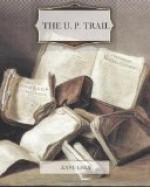And so they talked and argued at their tasks.
The women, however, had little to say. One, the wife of the loquacious Jones, lived among past associations of happy years that would not come again—a sober-faced, middle-aged woman. The other woman was younger, and her sad face showed traces of a former comeliness. They called her Mrs. Durade. The girl was her daughter Allie. She appeared about fifteen years old, and was slight of form. Her face did not seem to tan. It was pale. She looked tired, and was shy and silent, almost ashamed. She had long, rich, chestnut-colored hair which she wore in a braid. Her eyes were singularly large and dark, and violet in color.
“It’s a long, long way we are from home yet,” sighed Mrs. Jones.
“You call East home!” replied Mrs. Durade, bitterly.
“For land’s sake! Yes, I do,” exclaimed the other. “If there was a home in that California, I never saw it. Tents and log cabins and mud-holes! Such places for a woman to live. Oh, I hated that California! A lot of wild men, all crazy for gold. Gold that only a few could find and none could keep! ... I pray every night to live to get back home.”
Mrs. Durade had no reply; she gazed away over the ridges toward the east with a haunting shadow in her eyes.
Just then a rifle-shot sounded from up in the ravine. The men paused in their tasks and looked at one another. Then reassured by this exchange of glances, they fell to work again. But the women cast apprehensive eyes around. There was no life in sight except the grazing oxen. Presently Horn appeared carrying a deer slung over his shoulders.
Allie ran to meet him. She and Horn were great friends. To her alone was he gentle and kind. She saw him pause at the brook, then drop the deer carcass and bend over the ground, as if to search for something. When Allie reached his side he was on his knees examining a moccasin print in the sand.
“An Indian track!” exclaimed Allie.
“Allie, it sure ain’t anythin’ else,” he replied. “Thet is what I’ve been lookin’ fer.... A day old—mebbe more.”
“Uncle Bill, is there any danger?” she asked, fearfully gazing up the slope.
“Lass, we’re in the Wyoming hills, an’ I wish to the Lord we was out,” he answered.
Then he picked up the deer carcass, a heavy burden, and slung it, hoofs in front, over his shoulders.
“Let me carry your gun,” said Allie.
They started toward camp.
“Lass, listen,” began Horn, earnestly. “Mebbe there’s no need to fear. But I don’t like Injun tracks. Not these days. Now I’m goin’ to scare this lazy outfit. Mebbe thet’ll make them rustle. But don’t you be scared.”
In camp the advent of fresh venison was hailed with satisfaction.
“Wal, I’ll gamble the shot thet killed this meat was heerd by Injuns,” blurted out Horn, as he deposited his burden on the grass and whipped out his hunting-knife. Then he glared at the outfit of men he had come to despise.




